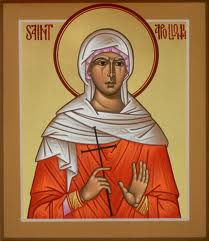(Feast Day ~ February 7)

We hear much in our day about torture and mob violence. Fallen, sinful man will always resort to this kind of behavior when he allies himself with the forces of evil. Devout Christians can expect to be frequently on the receiving end of this behavior. This was certainly true in the early days of the Church.
Near the end of the reign of Emperor Philip or the beginning of that of Decius (in the year 249), a riot broke out in the city of Alexandria. The turmoil was begun by a poet who prided himself on being able to foretell the future. He stirred up the local population in anger against the Christians and men took to the streets to attack these innocent people.
The first victim of this riot was an old man, Metras, who was told to say blasphemous things against the worship of the True God. When the old man refused, the mob dragged him through the streets, poked his eyes out with reeds, and stoned him to death. Thirsty for blood, the rioters then found Quinta, a Christian woman whom they took to the temple of one of the pagan gods. She was ordered to worship this idol, but instead, she poured out reproaches against this false god and she received the same martyrdom as Metras.
The angry mob then found Apollonia, an aged deaconess of the Church. They first beat her, especially on the face, so that most of her teeth fell out. They then dragged her out into a courtyard where they built a huge fire in which they intended to burn her alive if she did not renounce Christ. Apollonia asked for a moment to prepare and her tormenters took this as a sign of a possible victory for them. Perhaps the old woman would turn away from her Christian faith. But instead, Apollonia threw herself into the fire.
courtyard where they built a huge fire in which they intended to burn her alive if she did not renounce Christ. Apollonia asked for a moment to prepare and her tormenters took this as a sign of a possible victory for them. Perhaps the old woman would turn away from her Christian faith. But instead, Apollonia threw herself into the fire.
The story of St. Apollonia’s martyrdom was told to Fabius, the Bishop of Antioch, by St. Dionysius, the Bishop of Alexandria, so we have a first-hand account. As was true for many of the early martyrs, Apollonia was immediately revered as a saint. She was especially venerated in the West and, in the Middle Ages, became known as the saint whose intercessions could help with problems of the teeth.
Theologians have debated about whether St. Apollonia’s act of throwing herself on the fire could be considered suicide. This would have been the “honorable” choice of good pagan Romans or Greeks when public humiliation or fall from power was inevitable. But the Church has never condoned suicide and St. Augustine, among others, defended the saint’s actions as noble, showing that she preferred martyrdom to giving up her faith and that she was merely proceeding with the inevitable.
We praise God for the fearless courage of those early saints and ask that those who are in danger of mob violence in our day may be aided by the prayers of St. Apollonia.
Sources: The Lives of the Fathers, Martyres and other Principal Saints, by Rev. Alban Butler; Lives of the Saints, by Omer Englebert; The Oxford Dictionary of Saints, compiled by David Hugh Farmer; Lives of the Saints, by Augustine Kalberer.